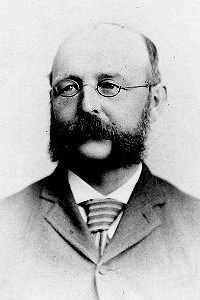Introduction
Born: January 9, 1839, Portland, Maine.
Died: April 25, 1906, Cambridge, Massachusetts.
Cremated: Location of ashes unknown.

Born: January 9, 1839, Portland, Maine.
Died: April 25, 1906, Cambridge, Massachusetts.
Cremated: Location of ashes unknown.

John was the husband of Mary Elizabeth Greeley.
He grew up in a musical family in Maine. His grandfather, an instrument maker, built the first pipe organ in the state of Maine.
His father and uncles were all music teachers, and his father carried on the family musical instrument business. One uncle was an organist, and another was a composer.
In the 1850s, Paine took lessons in organ and composition from Hermann Kotzschmar, completing his first composition, a string quartet, in 1855, at age 16.
After his first organ recital in 1857, he became organist of Portland’s Haydn Society, and gave a series of recitals to fund a trip to Europe where he hoped to further his music education.
On arrival in Europe, Paine studied organ with Carl August Haupt, and orchestration with Friedrich Wilhelm Wieprecht in Berlin.
He toured Europe, giving organ recitals, for three years, establishing a reputation as an organist that would precede his return to the United States.
After returning to America and settling in Boston, Massachusetts, in 1861, he was appointed Harvard University’s first organist and choirmaster.
In this role, Paine offered free courses in music appreciation and music theory that became the core curriculum for Harvard’s newly formed academic music department (the first such department in the United States) and his appointment as America’s first music professor.
Paine was a member of the Harvard faculty until 1905, a year before his death. His well received 1867 Berlin premiere of Mass in D gave Paine a reputation that helped him shape the musical infrastructure of the United States. His courses in music appreciation and music theory made the curriculum of Department of Music at Harvard a model for American music departments.
His service as a director of the New England Conservatory of Music (and the lectures he gave there) establish his place at the root of an instruction chain that led from George Chadwick to Horatio Parker to Charles Ives.
Paine was guest conductor of the Boston Symphony Orchestra in the final concerts of its first season, and his works were audience favorites.
Paine is noted for starting the American symphonic tradition, and for writing America’s first oratorio (St. Peter), the Centennial Hymn that (with orchestra) opened the 1876 Centennial Exposition in Philadelphia, Pennsylvania.
He was a founder of American Guild of Organists, and co-edited of Famous Composers and their Works.
In 1889, Paine made one of the first musical recordings on wax cylinder with Theo Wangemann, who was experimenting with sound recording on the newly invented phonograph.
Paine was among the initial group of inductees into the American Classical Music Hall of Fame in 1998.